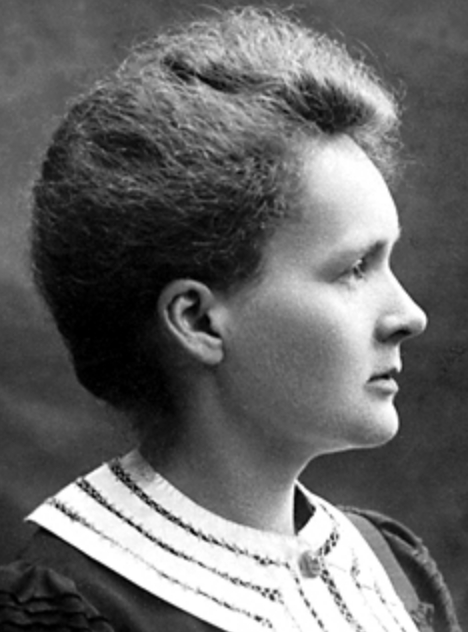On this date in 1867, two-time Nobel Prize winner Maria Salomea Curie, née Sklodowska, was born in Warsaw, Poland. Her father was an atheist and her mother was Catholic. The deaths of her mother and sister caused her to abandon Catholicism and become agnostic as a teen. (Marie Curie by Robert Reid, 1978.)
Curie moved to Paris to study at the Sorbonne in 1891, got her degree in math and married Pierre Curie in a civil ceremony. The couple had two daughters, Irène and Ève. Curie broke many barriers for her sex, becoming the first European woman to earn a science doctorate and the first to be awarded a Nobel Prize.
She and Pierre and physicist Henri Becquerel were jointly awarded the 1903 Nobel Prize in Physics “for their joint researches on the radiation phenomena discovered by Professor Henri Becquerel.” She coined the very word “radioactive.” She won the 1911 Nobel Prize in Chemistry for “the discovery of the elements radium and polonium, by the isolation of radium and the study of the nature and compounds of this remarkable element.”
Pierre died tragically in 1906 at age 46 when he slipped in the street and a horse-drawn cart ran over his head. Curie took over his professorship of general physics at the University of Paris, winning another first for women. She was also the first person and only woman to win a Nobel Prize twice and the only person to win a Nobel in two different scientific fields.
Yet in 1911 the French Academy of Sciences failed in a close vote to elect her as a member. Before the election, she was vilified by the right-wing press as a foreigner and atheist. Not until 1962 would a woman, ironically a doctoral student of Curie’s, be elected.
She became director of the Curie Laboratory in the Radium Institute of the University of Paris in 1914 and spent much of the rest of her life pursuing the goal of “easing human suffering.” Her daughter Irène and her husband Frédéric Joliot-Curie were jointly awarded the 1935 Nobel Prize for Physics for synthesizing new elements.
Her daughter Ève in her memoir “Mme. Curie” (1937) described all family members as rationalists. Curie wrote in 1923 that Eugène Curie, her physician father-in-law, was “a free thinker and an anticlerical, he did not have his sons baptized, nor did he have them practice any form of religion.”
Curie died at age 66 of aplastic anemia attributed to radiation exposure. In 1995 she became the first woman to be entombed on her own merits in the Panthéon in Paris. (D. 1934)


